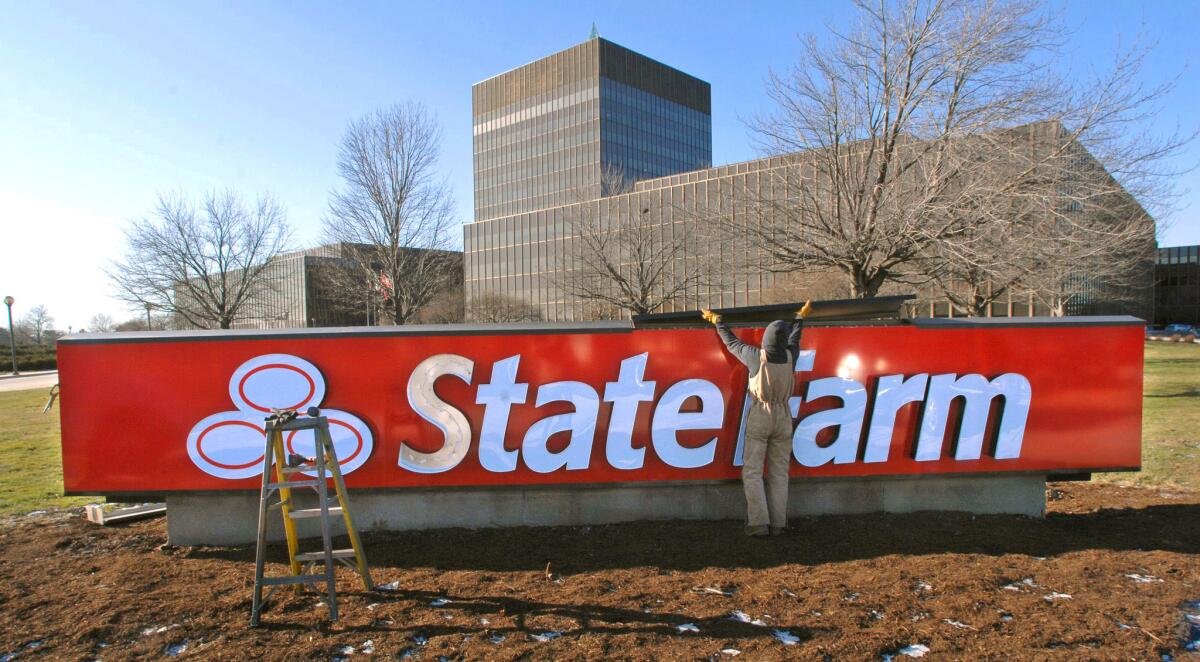State Farm isn’t cutting rates fast enough and could be fined billions, insurance regulator says

The California Department of Insurance says State Farm is not moving fast enough to lower its rates for homeowners and renters and it could face billions of dollars in fines if it doesn’t speed up the process.
The threat of hefty fines, sent Friday to State Farm, escalates an increasingly bitter fight between the department and the Bloomington, Ill., insurance giant.
Insurance Commissioner Dave Jones ordered a rate cut as of Dec. 8, but State Farm has challenged that order in court and does not plan on cutting rates until Feb. 13.
The legal notice alleges that State Farm is violating the state’s insurance code because it is continuing to charge rates deemed by Jones’ office to be too high.
The company could be fined as much as $10,000 for each act of overcharging policyholders. Michael Levy, an attorney for the California Department of Insurance, estimated that about 4,000 State Farm policies in the state are up for renewal every day, meaning that in the time between Dec. 8 and Feb. 13, more than 250,000 policyholders could be overcharged — and that State Farm’s fines could top $2.5 billion.
In a statement Monday, State Farm spokesman Sevag Sarkissian said the company has taken steps to comply with the ordered rate cut but that, because insurance renewal bills must be sent at least 45 days early, customers won’t see the new rates until February.
“State Farm believes it is in full compliance with the California Department of Insurance rate making process,” Sarkissian said in an emailed statement.
State Farm should charge customers the lower rate approved by the department, not what’s printed on a policy renewal, Levy said.
Friday’s notice and threat of fines are the latest in a two-year battle between the California Department of Insurance and State Farm over the insurer’s rates and the limits of California’s landmark insurance law, Proposition 103, which requires the department to sign off on any increase or decrease in insurance rates and allows outside groups to challenge rate changes.
State Farm in late 2014 asked the department for permission to raise its homeowners, renters and condo insurance rates an average of 6.9%. Two advocacy groups, Consumer Watchdog and the Consumer Federation of California, challenged the increase.
After more than a year of proceedings, an administrative judge last year recommended that Jones not only reject State Farm’s proposed increase but also order the insurer to cut rates an average of 7% — less for homeowners, more for renters and condo owners — and to make those cuts retroactive to July 2015.
Jones signed off on that recommendation in November, marking the first time since Proposition 103 was approved in 1988 that any insurance commissioner had ordered a retroactive rate cut. The order called for refunds totaling about $100 million to 1.7 million customers.
State Farm is fighting Jones’ order in state court in San Diego, arguing first that the state erroneously determined its rates were too high.
When determining whether rates are appropriate, the state is supposed to look at whether insurers have enough money to cover potential claims, estimating revenue from premiums and income from insurers’ investment portfolios. The company has argued that the administrative judge improperly took into account investment income earned by State Farm subsidiaries unrelated to its California operations.
The insurer also argues that Proposition 103 does not give the insurance commissioner authority to change rates retroactively. Last month, San Diego County Superior Court Judge Katherine Bacal put the refunds on hold until the court challenge is decided, but ordered State Farm to cut rates per Jones’ order.
Consumer advocacy groups and other insurance companies are watching the case closely because the outcome could strengthen or weaken the insurance commissioner’s power under Proposition 103.
Insurance trade groups in a court filing last month called Jones’ refund order “a sudden reversal” in how Proposition 103 is interpreted and that if the state can order retroactive rate cuts, it could destabilize the state’s insurance industry. Insurers, the trade groups argue, could charge what they believe are permissible rates only to be ordered years later to reduce rates and pay big refunds.
“Such a momentous and sudden change stands in contrast to 26 years of consistent application of the law, and has huge repercussions for the industry,” the trade groups, including the Personal Insurance Federation of California and the Assn. of California Insurance Companies, wrote.
Follow me: @jrkoren







